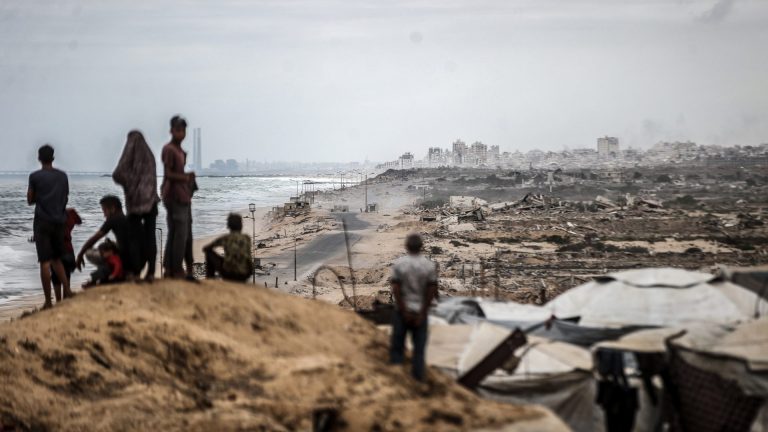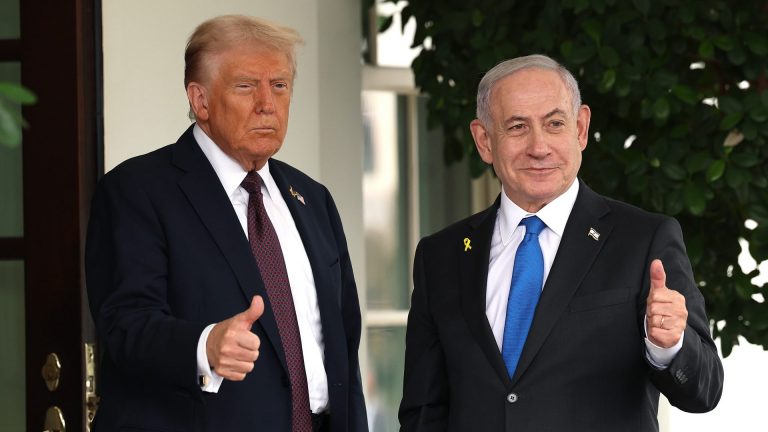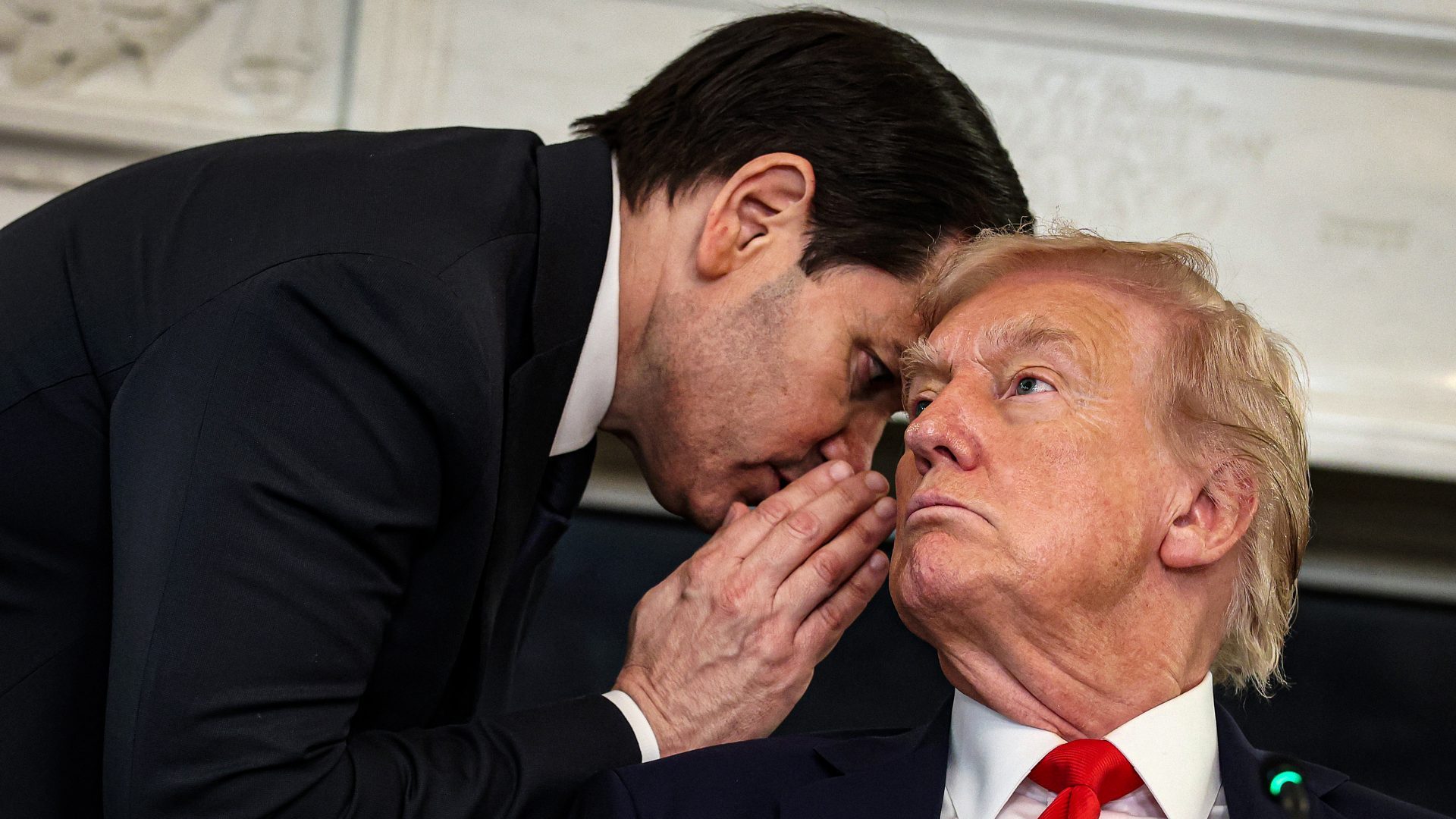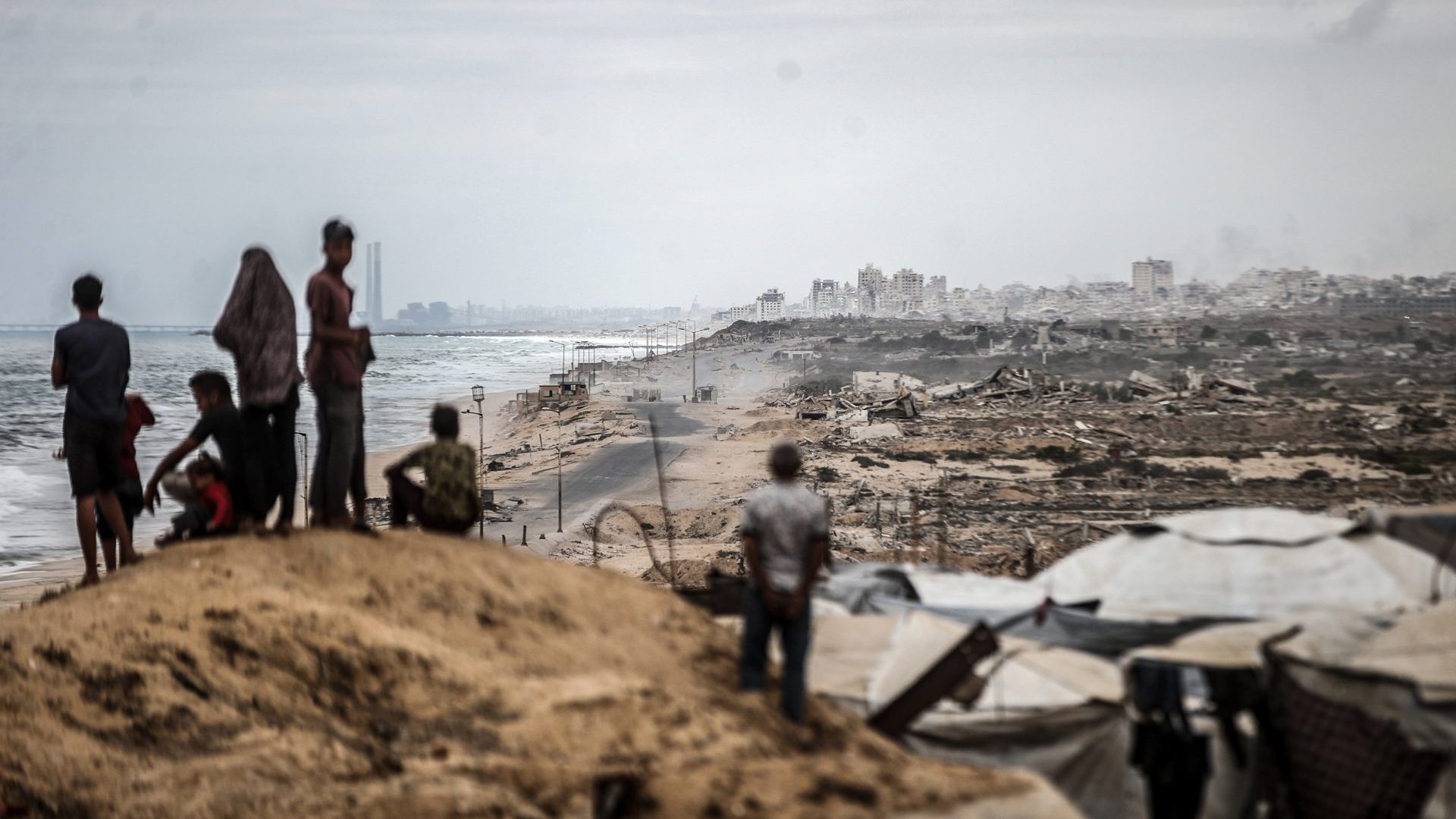Last week, Donald Trump’s America edged that much closer to outright authoritarianism. Letitia James, New York’s attorney general, who sued him successfully for fraud last year, was indicted over risibly insignificant technicalities on a mortgage application: a clear act of politically directed retribution.
On Wednesday, James Comey, the former director of the FBI, and a long-standing target of the president’s anger, pleaded not guilty to charges of making false statements to Congress and obstruction of justice. On the same day, Trump posted on Truth Social that Governor JB Pritzker of Illinois and Mayor Brandon Johnson of Chicago should be jailed for allegedly failing to protect ICE agents.
On Thursday night, a federal judge temporarily blocked Trump’s deployment of National Guardsmen to Chicago – though the 7th circuit court of appeals ruled on Saturday that the troops from Texas could stay in Elwood, Illinois. On Friday, soldiers started to patrol the streets of Memphis, Tennessee. At the time of writing, the president was embroiled in a court battle to send guardsmen into Portland, Oregon.
As Trump warned in lurid language that the nation’s cities were on the brink of an “insurrection” – an “alternative fact”, if ever there was one – his administration began to lay off federal workers in response to the government shutdown. On Thursday, he made quite explicit the partisanship of his actions: “We’re only cutting Democrat programs, I hate to tell you”.
Also last week: Trump brokered what may prove to be a historic deal between Israel and Hamas: a hostages-for-prisoners exchange, an immediate ceasefire, the resumption of aid supplies into Gaza, and the first-phase withdrawal of the Israel Defense Forces (IDF) to the so-called “yellow line”.
So: war at home and peace abroad? The contrast has encouraged some to argue that there are, in fact, two Trumps: the authoritarian ruler pursuing aggressive vendettas against his political enemies, against migrants and against protestors; who is also, inexplicably, a conciliator, negotiator and opponent of conflict beyond America’s shores.
This is to miss the point completely. There is only one President Trump (which is plenty), and the very personal characteristics that are imperilling the constitutional fabric of the US republic are the same as those that have brought the possibility of peace to the Middle East.
By some margin, he is the least literate and historically knowledgeable man ever to hold his office. His only hinterland is the putting green and the fairway. For this reason, the competing ancestral claims of the Israelis and Palestinians are of no interest to him whatsoever.
In the unlikely event that he has heard of Yom Kippur, he probably thinks he is “a terrific guy, who’s doing an incredible job”. As for the Nakba – isn’t that an Indian crypto-currency?
It is precisely because he is an uninformed bully, a hot mess of impatience and narcissism, that he was able to get this deal across the line. If there is one man whose caprice and vengefulness truly frighten Benjamin Netanyahu, it is Trump.
Who else could have forced the Israeli prime minister to apologise on camera to his Qatari counterpart Mohammed bin Abdulrahman bin Jassim al-Thani for the Israeli attack on Doha on September 9. In this version of The Godfather, it was Jared Kushner, Trump’s son-in-law and an architect of the deal, who played Luca Brasi, holding a metaphorical gun to Bibi’s head, as the Don made him an offer he couldn’t refuse.
The frequently repeated claim that this deal had been on table for more than a year also misses the point. The Palestinians thought Joe Biden was an irredeemable Zionist; and the Israelis thought he was weak, personally sympathetic to the Jewish state but no longer in control of the pro-Palestinian wing of the Democratic party.
What Trump also intuited in his brutal way was that Netanyahu would never settle until Iran’s network of proxies had been destroyed. But – once that was accomplished – he insisted upon compliance. “I don’t know why you’re always so fucking negative,” he reportedly said to Bibi. This is a win. Take it.” He took it.
By the same token: when Trump let the leadership of Hamas know that, if they did not agree to the deal, he would let Netanyahu off the leash, they took him seriously. They grasped, correctly, that they were not dealing with a statesman but a mob boss. In practice, if they wanted Gaza City to be more than a very large crater – now was the time to say “yes”.
It is challenging when bad men do good things; or more accurately, take actions that have unquestionably humanitarian outcomes. Philosophers might call it the “Starling Dilemma”. Was Agent Clarice Starling wrong in The Silence of the Lambs (1991) to seek advice from Hannibal Lecter – or, as Trump mysteriously calls him, “the late, great Hannibal Lecter” – to track down the serial killer “Buffalo Bill”?
Should she have put up her hand as the maniac in the cell began to speak and said: “I’m sorry, my principled opposition to cannibalism and liver-eating Chianti-drinkers prevents me from giving you a platform”? Plainly not.
Let me frame it another way. If two gangs had been taking lumps out of one another on your street since 1948, who would you send to sort it out? Darth Vader? Or an Ewok with blue fur and a ‘Stand Up to Nasty People!’ T-shirt? Thought so.
As Tony Blair likes to say: “What counts is what works”. Whether or not Blair’s own prospective involvement in the peace process is acceptable to the Palestinians remains to be seen. The wounds of the Iraq War in the region are still livid and that memory may outweigh the undoubted value of his experience as a successful peacemaker in Northern Ireland.
But Trump – sorry, folks – is thus far the hero of the piece. In Tel Aviv on Saturday night, the crowds booed when Steve Witkoff, his envoy to the Middle East, mentioned Netanyahu. But they cheered the name of the US president, whose daughter, Ivanka spoke, as did Kushner, her husband. The partition between dynastic power and geopolitics blurred ominously.
In the land of wolves, there are some fights that only the fiercest, nastiest wolf in the forest can bring to a halt. And this is the bigger picture to which all progressives should now be addressing themselves.
I was dismayed last week to hear so many commentators and podcasters apparently more delighted by Trump’s failure to win the Nobel Peace Prize than by the deal itself. Yes, of course, the president’s juvenile longing for this accolade is embarrassing and funny.
But let’s say that the ceasefire holds, the rebuilding of Gaza begins at pace and the region is set on a path to co-existence and prosperity. Still a long shot – Hamas fighters are already engaged in a bloody feud with rival clan members – but let’s dare to be optimistic. If Trump wins the prize next year, will that not be a minuscule price to pay for the hugely improbable ending of a world-historic conflict?
Suggested Reading


This deal is a calamity for Gazans
My point is that the laughter at the president’s expense was born of weakness. It was the derision of observers, of those who value purity over action, personal virtue over meaningful change. It was the sound made by losers with nice homes; who despise the people who vote for Trump and his counterparts around the world; who – in many cases – make their living from pointless pearl-clutching.
For what is this moment if not a colossal reproach to the liberal international order? Where this nexus of institutions, NGOs, courts, diplomats and high-minded media personalities has so conspicuously failed, for so long, a conman, convicted felon, shameless grifter and world-class liar has succeeded, through sheer force of personality? Ought that not to inspire – oh, I don’t know – a pause for reflection?
One of my favourite books is Dean Acheson’s Present at the Creation: My Years in the State Department (1969), an astonishing account of the years 1941 to 1952 and the construction of the postwar order. As Acheson concedes, the task was beyond daunting.
“Not only was the future clouded,” he writes, “a common enough situation, but the present was equally clouded. We all had far more than the familiar difficulty of determining the capabilities and intentions of those who inhabit this planet with us. The significance of events was shrouded in ambiguity. We groped after interpretations of them, sometimes reversed lines of action based on earlier views, and hesitated long before grasping what now seems obvious”.
And yet look at what was created in that brief period of incredible collective energy, leadership and cross-border collaboration: the United Nations, Nato, Organisation for European Economic Co-operation (precursor to the OECD), International Court of Justice, World Health Organisation, European Coal and Steel Community (precursor to the EEC), and the European Convention on Human Rights. From the ashes of unprecedented carnage arose an entirely new architecture of multilateral cooperation.
In 2025, most of those structures are calcified; many are downright dilapidated. The successors to Acheson’s generation have not adapted, innovated and fortified these institutions against the howling gales of hypermodernity.
Look, for instance, at the UN. Where has it been since October 7? What, if anything, has its secretary-general António Guterres done to bring peace closer? No shortage of virtue-signalling, that’s for sure. If you think that devoting an entire international institution to the spirit of the BBC’s Thought for the Day: well, the UN has put in a shift.
It shouldn’t need to be said, but plainly it does. The boss of the UN should command the respect and attention of the world. He or she should be – at least – on a par with the leaders of the superpowers. He or she should get things done and insist upon others getting things done. The secretary-general should be the personal guarantor of the UN’s strength, kinetic will and credibility.
In the past ten years, the general assembly has passed nine resolutions against Iran; 10 against North Korea; 12 against Syria; 29 against Russia; none against China; and no fewer than 173 against Israel. It’s not that the Jewish state should be beyond reproach; simply that this ridiculous disproportionality makes it very difficult to see the UN as anything other than an expensive echo chamber; to take it seriously, in other words.
By attrition over many decades, but especially in the 21st century, the liberal international order has lost its grip, its relevance, its bite. It spends more time on feeling good than on being effective.
I’m sure the representatives of the United Kingdom, Canada, Australia, Portugal, France, Belgium, Luxembourg, Malta, Monaco, Andorra, and San Marino all felt pretty great about themselves on September 21 and 22 as they formally recognised Palestinian statehood.
But it was Trump and Witkoff who took care of business the following day as they held a closed-door meeting with eight Arab and majority-Muslim countries at the UN’s headquarters; selling the deal to them and, crucially, offering reassurances that the US would not allow Israel to annex the West Bank.
That mini summit was a significant stepping-stone on the way to last week’s agreement. The statehood-recognition jamboree was a feelgood fantasia that might even have derailed the talks.
Keir Starmer’s government is now claiming that it played an important role “behind the scenes”. According to sources close to the peace process, this role should not be exaggerated. Yes, Jonathan Powell, the PM’s national security adviser, MI6 and military personnel have provided useful counsel and intelligence.
But the PM’s public conduct has been a disaster: a panicky zigzag that has led him from proscribing Palestine Action (an affront to all who support the Palestinians, not to mention the right to free speech and free assembly), to recognising Palestine (a wildly premature leap to the 19th point in the meticulously sequenced 20-point peace plan), to responding vapidly to the Manchester synagogue attack. If the UN is not serious, then neither, right now, is the UK.
Every peace process has its saboteurs: there will be jihadi forces – and not only Hamas – that find intolerable the prospect of a Palestinian state that is not theocratic; the Israeli far right will not easily surrender its dream of a Greater Israel. Brace yourselves for setbacks and moments of crisis. There will be trade-offs, amnesties and compromises that are very hard for one side or the other to stomach (for instance: I wouldn’t hold your breath if you’re longing to see Netanyahu on trial at The Hague).
Suggested Reading

Trump’s Gaza peace plan is full of contradictions
What lies ahead is the work of decades, not years. But what has been achieved already should give all progressives food for thought: and not just in this context.
Do you want to live in a world where we have to rely on strongmen, mobsters and crime families to impose some version of peace? Or do you want an international order that has a higher ambition than self-righteousness?
Do you want to feel good, or be effective? Choose.




